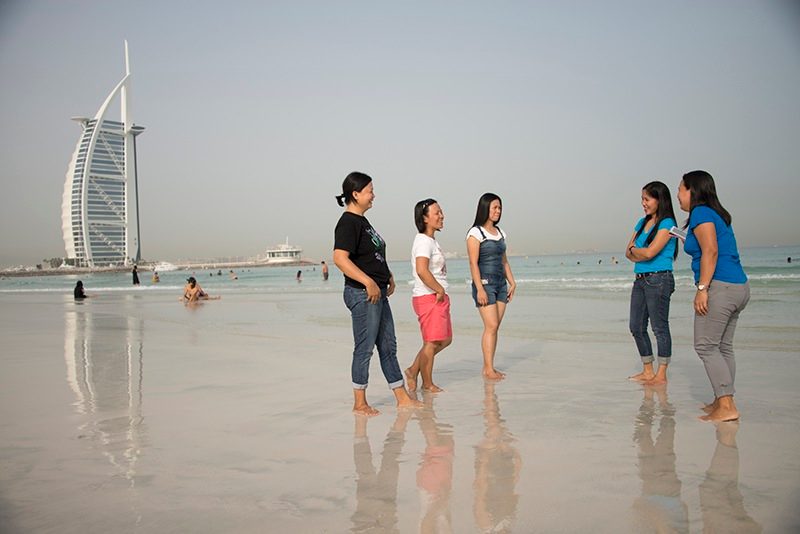SUMMARY
This is AI generated summarization, which may have errors. For context, always refer to the full article.

DUBAI, United Arab Emirates – With many Filipino workers still broke despite working overseas for many years, a group of successful Filipinos and industry experts will offer free tips to OFWs wherever they may be, through the mobile app, The Wealthy Filipino Migrants.
Filipino lawyer Michael Barney Almazar, who holds regular free legal seminars for OFWs at the Philippine Embassy and Consulate in Abu Dhabi and Dubai, will bring together outstanding Filipinos at the OFW regional summit at Dubai’s Desert Palm Hotel when the app is launched on February 27.
Among the confirmed speakers at the summit are the following:
- Vicky Belo and Hayden Kho of Belo Medical Group
- Verna Wee of Wee Group of Companies
- Loida Nicolas Lewis of US Pinoys for Good Governance
- Commission on Overseas Filipinos Secretary Imelda Nicolas,
- Gene Alcantara of European Network of Filipinos
- Commission on Elections Commissioner Arthur Lim
- Bong Osorio, communications and spokesman of ABS-CBN
- Tom Mirasol, president international sales of Ayala Land Incorporated,
- Fidel Escurel of MEANFid-Qatar
- Genesis Lontoc, marketing head for Southeast-Asia at UAE Exchange
Philippine Ambassador to UAE Constancio Vingno Jr and other Filipino officials advocating financial literacy among OFWs will also join the summit.
Almazar, one of the recipients of this year’s prestigious The Outstanding Young Men Awards (TOYM), will also launch the special digital edition of The Essential OFW Guide to UAE. He penned this last year to help Filipinos with the A-Z of staying out of trouble in their host country.
“This project is under the Office of the President so we have structures to follow. Personally, what I want the participants to have is the understanding of how important their lives are. For them to realize their worth. That they deserve a better Philippines,” said Almazar, who is licensed to practice law in the Philippines. He is currently a director at Gulf Law.
Almazar, who was recently chosen to represent the OFWs in the Middle East and North Africa region which accounts for about 3.5 million, said he’s up for the big task and wants to empower OFWs with vital information.
“It is a big task. I would like to help as much as I can. I believe that the best way for me to empower them is by providing them the needed information. By making them understand the difference between what they can do in the Philippines and those that they cannot do in the UAE, they can be saved from troubles,” he said.
Debt problem
Unofficially, close to a million Filipinos live and work in the UAE. Many of them find themselves in trouble with the law through mounting debts to individuals, private banks, and other financial institutions.
The UAE is the second biggest economy in the Arab world after Saudi Arabia with $570 billion gross domestic product in 2014. It has the most diversified economy in the GCC region, with expats accounting for more than 80% of its total workforce.
Personal loans and credit cards are easily accessible in the UAE with interest rates of as low as 4% annually. Many Filipinos are lured by the promise of easy money, only to find themselves heavily indebted in the end due to accumulated interest rates and hidden charges.
Credit card debt is one of the top problems of OFWs in the UAE and the most common question asked to Almazar when he holds free legal aid seminars.
Almazar said Filipinos should realize that when they applied for a credit card, they have agreed to the terms and conditions of the bank, which include paying all their purchases plus any interest, late charge, over limit penalty, annual membership fee, and other applicable bank charges.
“The key to maximizing the benefit of credit is paying all your purchases in full on the due date. If you cannot afford to make the full payment, strive to regularly pay more than just the minimum and do not use the card further until you are able to clear your balance. Adding purchases on top of your card balance will only make your interest payments bigger,” he said.
For some Filipinos, problems with mounting debts turned from bad to worse, requiring jail time.
Almazar said this is where the group’s money management practical lessons would come in handy, to help redeem themselves. – Rappler.com
Add a comment
How does this make you feel?
There are no comments yet. Add your comment to start the conversation.